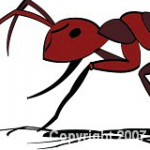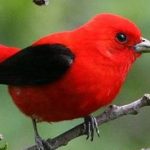
Bugs are a pain. Sometimes they bite, and sometimes their bite kills. Think Lyme’s disease, West Nile and malaria. Bugs get in your house, make nuisances of themselves. Who in their right mind would grumble about a clean windshield in bug season? Who would complain about a shortage of mosquitos or black flies or any other insect?
Birds would. (Bats would, also, but we won’t go there.) Even seed-eating birds feed their young high-protein food like caterpillars, spiders and flying insects, even after they’ve left the nest. Without insects, birds wouldn’t make it.
And that would be very, very sad.
Trouble is, there seems to be a shortage of both insects AND birds this spring in New England. The black fly population was sketchy at best, and mosquitos……..remind me what they look like?
I have known and loved birds since riding horseback with my mentor Lydia. But since those days of yesteryear, I have noticed the steady disappearance of one bird after another. Meadowlarks, towhees, whippoorwills, nighthawks—gone. New ones have come from the south—vultures, cardinals, mockingbirds, Carolina wrens—but we’re losing more than we gain.
And silence at this time of year when the woods should be ringing with music. No thrushes with their evensong; no warblers singing in treetops.
I have no proof of any connection between the lack of insects and birds here in New England, but it worries me. Bugs are a pain, but they are essential to the ecological health of the natural world. Honeybees have been struggling in recent years, and without bees, most of our food crops would fail.
Take time to notice bugs. You may not like them, but you really wouldn’t like a world without them.
The next time you see a mosquito, thank God and call in the swallows, warblers, and dragonflies. Bats don’t normally do lunch, but they’d sure go for a midnight snack.


Hi Ellie,
Please feel free to collect the mosquitos here at Camp and bring them to your home town, I assure you we have no shortage here!
Although, black fly season only seemed to last about 5 days, I remember in the past it seemed to go on for months.
Thanks for the interesting Blog!
Rob, Fireside mosquitos and I go back a long way. I remember trying to walk the old roadway just above Little Long Pond. They were so bad we HAD to go into town for repellant. No choice allowed. Hopefully, the population is down somewhat from that, but are there enough to support a good colony of bats? That’s the test!
I have only seen 2 bats at camp this year and they were down by the lake. They are usually all over camp this time of year.
Not a good sign! I love bats, but they’re scarce these days. I think rabies was a problem some years ago, but now the problem, they say, is white-nose syndrome that leaves them emaciated, dehydrated, and exhibiting erratic behavior. An estimated 2 million bats nationwide have fallen victim to this disease. Please send you excess mosquitos to them, as well as to our yard. We would like to see bats, too!
Dear Ellie,
A few years back, maybe five or six, we had swarms of dragon flies in my yard., not biblical proportions mind you or petulant but If I was still long enough and my hand was fast enough they would come within reach and many times i was able to land a beauty.
I don’t know much about them but that some were very colorful while others were plain and most were very large. I did my best to research their names and look for the rarer ones to grab a hold of, it was all catch and release mind you except one time i tried to tape ribbons on them and see if i could either hold them like a kite or just watch them fly with the ribbon attached, in both cases they would just play dead until i released the miniscule piece of tape that held the ribbon, bummer, They do not make great carrier pigeons.
Once while on top Gunstock mountain during the summer Soulfest I stunned the crowd i was in line with waiting to get back down the mountain on the ski lift. There were many Dragon flies darting to and fro from the trees to the crowd and as one ventured ever closer to during his route i reached out with lightening speed and brought him in to the shock of those around me. I think they expected he would bite me but they are are harmless.We all examined him and were delighted.
Last nite while working late in Andover, Mass i was outside and one landed on the ground next to me. He allowed me to pick him up which i thought was rare and noticed he had very interesting markings on his wings i had not seen before. In any case their numbers here have dwindled fast and today there are none in my yard. I miss them and wished i had kept a log of the types i caught or tried to catch.
As an antique dealer, 30 years ago i passed on a vintage collection of mounted insects having many well endowed features still well preserved from the turn of the century also inscribed beneath them in calligraphy their Latin scientific names under and within an old oak trimmed glass case. It was extraordinary and have never seen its equal for sale and regret not making the purchase which at the time was well over $300 and if I had gotten involved in the bidding war who knows where it would have gotten but i still regret not getting it to this day.
I eventually purchased a large collection of cases that was collegiate and had some nice specimens of beetles but sold them of one by one. There are many colleges that hold huge collections and maybe someday I could find my way into viewing them but as for mosquitoes i hope the birds can get along without them and i have no compassion for bats having had to chase so many of them out of my attic and cleaning out their droppings, besides who eats the bats. If their only purpose was to eat mosquitoes then i say lets be done with the both of them and my only advice to you would be to leave bowls and buckets and cans of standing water out for the mosquitoes to breed. I am guessing you may be they only person who mourns their loss but i understand your feeling and am willing to take a few bites on your account despite my willingness to be overjoyed at their demise.
I too have noticed less bugs and types of birds in my yard except that there are more cardinals that usual. i don’t see the starlings(not native to North America) or other birds except for the nuthatch and titmouse but their numbers are way down.
So, i am glad there are less bugs except i would like to see more Dragon flies but they eat the bugs that aren’t here so it goes that neither are they, a classic case of taking the good with the bad. I’m sure that in enough time both shall return and we may have a lot to say about that. Dave.
I havent noticed any colorful finches at all. I have noticed more blue jays and cardinals it seems.? maybe its just me. maybe other peoples yards or feeders have a different experience.
I don’t do feeders, Dave, and maybe that’s my problem. I do see and hear some cardinals but very few bluejays, which is most unusual. Send some of those my way, will you? I never thought I’d actually miss seeing bluejays! I’ll be posting another blog on Saturday about a rare visitor, at least in our yard. Tune in!
Ellie, Saturday has come and gone and soon hopefully will be this weather and my lethargy
Perk up, Dave. It’s cool now. Enjoy the birds and bugs! : )